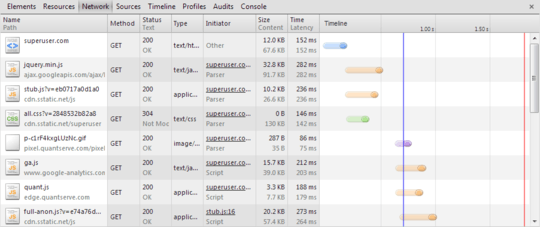Yes, it does save bandwidth and this is easily verifiable by looking at the Network tab of Tools > Developer tools in Chrome. When you block JavaScript for a site, Chrome simply doesn't download them and thus saves on bandwidth. This is being done at the "Application" layer of the OSI model (you asked about which layer it happened at, so I wasn't sure exactly what you meant, but I assumed you meant the OSI model).
Here are the results for me with JavaScript blocked for SuperUser.com

Here are the results for me with JavaScript not blocked for SuperUser.com

As you can see, the loading times with JavaScript blocked were less than a second, but with JavaScript enabled, it took around 2 seconds.
It should be noted that in this experiment, I did the "with JavaScript blocked" test first, and had never gone to SuperUser.com in Chrome before. I did the "with JavaScript not blocked" test second.


